Best Crypto Exchanges in Switzerland
.webp)
Summary: Switzerland is one of the most advanced cryptocurrency hubs, supported by progressive regulation and its thriving “Crypto Valley” in Zug. Swiss investors have access to a wide selection of trading platforms that comply with the Financial Market Supervisory Authority (FINMA) standards.
Here are the six best cryptocurrency exchanges accepting Swiss Francs (CHF) deposits:
Kraken is the best exchange in Switzerland as it provides free CHF deposits, a wide range of cryptocurrencies, low investment fees and is compliant with Swiss regulations.
Licensing & Regulation
Holds a MiCA license in Europe
Supported Assets
490+ Cryptocurrencies
CHF Deposit Methods
SEPA, SWIFT, SIC, Bank Transfers, Cards
Top Crypto Trading Platforms in Switzerland
Switzerland’s cryptocurrency market is thriving under a clear regulatory framework led by FINMA. The country is home to both domestic and global platforms that support Swiss franc deposits, advanced security features, and comply with FINMA regulations. The table below highlights the top exchanges and compares their fees, features, CHF deposit methods, and supported assets.
1. Kraken
Kraken is one of the most trusted and feature-rich platforms in Switzerland. Since launching in 2011, the exchange serves more than 15 million users, offering access to 490+ cryptocurrencies with deep liquidity and tight spreads. Its focus on transparency is reinforced by audited Proof of Reserves.
The platform caters to a wide range of trading styles. Beginners can buy crypto like Bitcoin and Ethereum with as little as $10, while more advanced users can unlock Kraken Pro for professional-grade charting, margin trading with up to 5x leverage, and access to 300+ futures contracts.
Kraken isn’t limited to crypto. Swiss investors can diversify further with tokenized U.S. stocks (xStocks) and commission-free equity trading. Its staking program pays rewards up to 22% annually on supported assets, while Kraken Institutional provides custody, OTC, and prime brokerage services.
Platform Highlights:
- Fees: Spot trading from 0.16% (maker) and 0.26% (taker); zero-fee option with Kraken+ subscription.
- Supported Assets: 490+ cryptocurrencies plus tokenized U.S. stocks and ETFs.
- Regulation & Licensing: Holds a MiCA license across Europe and is regulated in Switzerland.
- CHF Deposit Methods: Bank transfers (SEPA/SWIFT), SIC (Bank Frick), debit cards, credit cards.
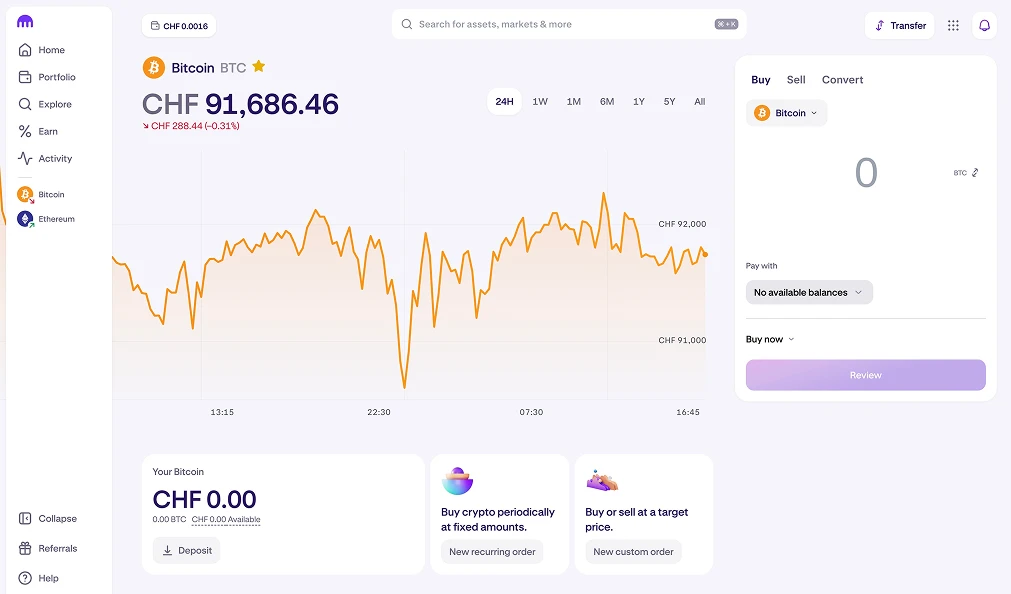
2. Bybit
Bybit has grown into one of the most recognizable names in derivatives trading, and it has a strong presence among Swiss investors who want advanced tools. Founded in 2018, it now has over 75 million registered users worldwide and a daily trading volume frequently surpassing $39 billion.
With support in multiple languages, including German and French, the platform caters to Switzerland’s diverse investor base. Swiss traders use Bybit for its wide range of products, such as spot markets, perpetual and inverse futures, and options contracts with leverage scaling up to 200x.
Features like copy trading and AI-powered TradeGPT make it easier to follow experienced traders, while bots such as grid, futures combo, and DCA bots automate strategies. It has also introduced the Bybit Card, offering up to 10% cashback and integration with everyday purchases.
Platform Highlights:
- Fees: Spot trading starts at 0.1%.
- Supported Assets: 2,100+ cryptocurrencies.
- Regulation & Licensing: Holds a MiCA license and is regulated across Europe.
- CHF Deposit Methods: Bank transfers, SIC, SWIFT, Zen.com, Visa, Mastercard, Apple Pay, Google Pay, Samsung Pay.
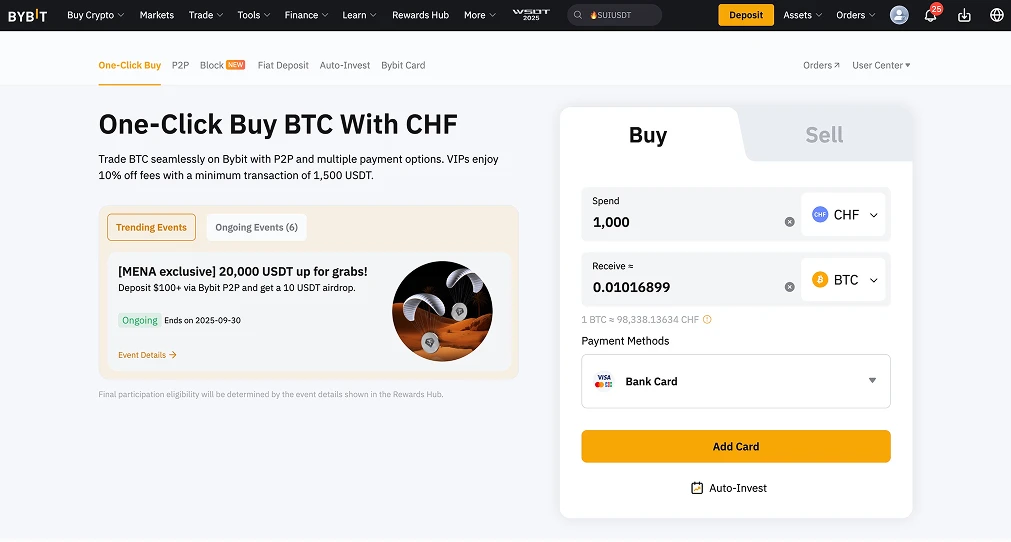
3. Binance
Binance is the world’s largest cryptocurrency exchange by user base and trading volume, serving over 270 million users across 180 countries. Its dominance comes from offering one of the broadest selections of products in the market, supporting spot, margin, options, and futures trading.
One of the standout features is its copy trading system, which allows beginners to mirror the strategies of experienced traders. Beyond this, users in Switzerland can explore Binance Earn, where funds can be placed into flexible savings accounts, locked staking, or liquidity pools to generate yield.
The platform also operates Binance Launchpool and Airdrop portals, offering early access to new tokens and rewards. Binance continues to expand beyond trading. Its NFT marketplace enables users to trade digital collectibles, while Binance Pay provides crypto payments for goods and services.
Platform Highlights:
- Fees: Spot trading from 0.1% with discounts for BNB token holders.
- Supported Assets: 500+ cryptocurrencies.
- Regulation & Licensing: Holds a MiCA license to operate across Europe.
- CHF Deposit Methods: Bank transfer (SEPA/SWIFT), Zen.com, credit cards, debit cards.
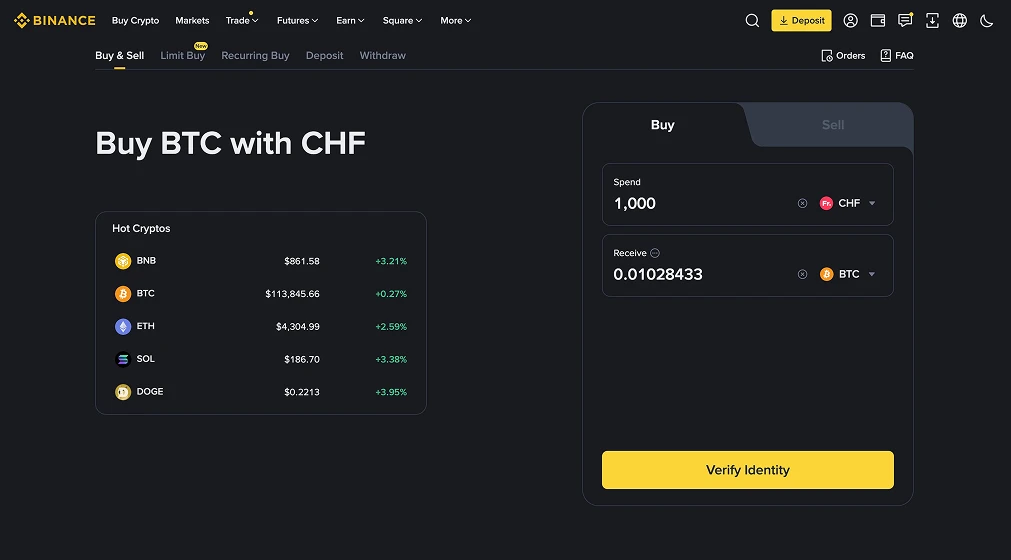
4. Bitpanda
Bitpanda has grown into one of Europe’s most versatile investment platforms. Headquartered in Vienna and fully regulated under European law, it gives Swiss investors a secure and trusted gateway to more than 600 cryptocurrencies and over 3,000 stocks, ETFs, commodities, and precious metals.
What sets Bitpanda apart is its multi-asset offering. For those who prefer diversified exposure, Bitpanda offers Crypto Indices, which let users auto-invest in baskets of digital assets with a single click. Meanwhile, features like Cash Plus and staking services enable users to earn extra yield on idle balances.
Security and compliance are central to Bitpanda’s appeal. Funds are stored in offline wallets, the platform is ISO 27001 certified, and strict anti-money laundering safeguards are in place. As a European platform, the interface is accessible in English, French, Italian, and German.
Platform Highlights:
- Fees: Crypto trades typically cost around 1.49%.
- Supported Assets: 600+ cryptocurrencies, 3,000+ stocks, ETFs, commodities, and metals.
- Regulation & Licensing: Regulated in Austria under FMA; compliant with EU standards.
- CHF Deposit Methods: Bank transfer, Apple Pay, credit cards, debit cards, PayPal.
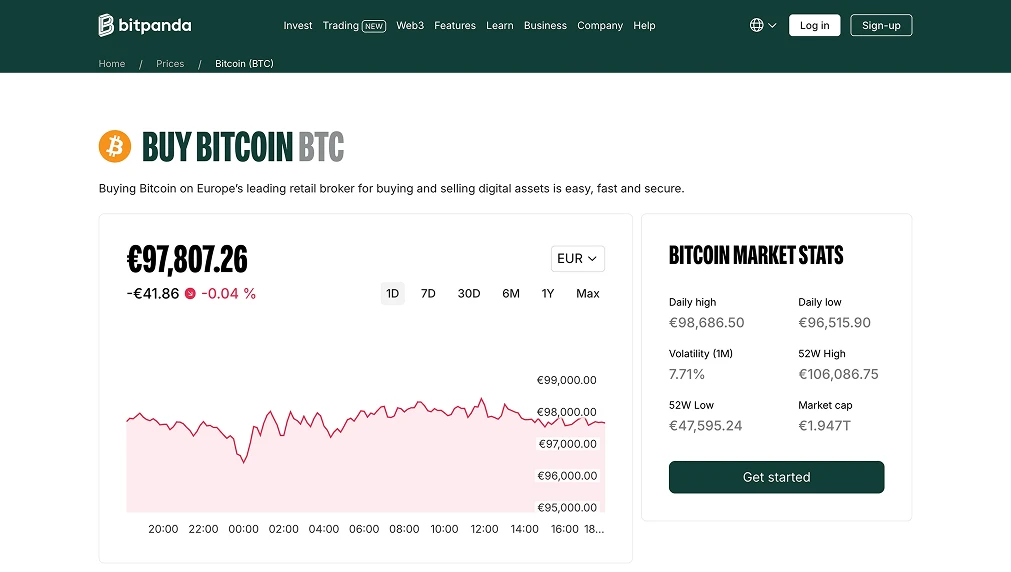
5. SwissBorg
SwissBorg is a homegrown success story, engineered in Lausanne and now serving nearly 880,000 verified users across 47 countries. The platform has become the country’s #1 crypto investment app thanks to its transparent pricing, strong compliance record, and focus on investor protection.
The main feature is SwissBorg’s Smart Engine, which scans multiple centralized and decentralized exchanges to secure the best execution price on every trade. Investors can also set up Auto-Invest plans to automate purchases through dollar-cost averaging, reducing market volatility over time.
The exchange offers SwissBorg Earn, where users can generate yields of up to 15%. The app also provides exclusive Alpha Deals, giving investors early access to pre-sales of promising crypto projects. Its native token, BORG, powers the ecosystem, and holders can lower fees or boost yields.
Platform Highlights:
- Fees: Transparent pricing; exchange fees range from 1.49% down to 0.25% with Premium tiers.
- Supported Assets: 200+ cryptocurrencies.
- Regulation & Licensing: Licensed under FVT000326 in Estonia and E2022-034 in France; adheres to EU compliance standards.
- CHF Deposit Methods: Bank transfer, Visa, Mastercard, Apple Pay, Google Pay.
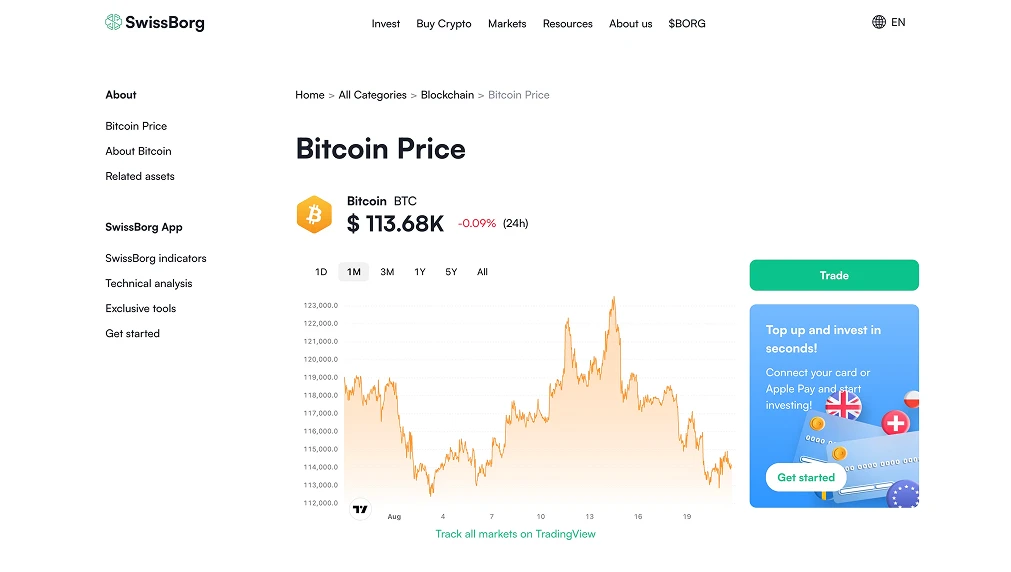
6. Uphold
Uphold is one of the most accessible trading platforms for newcomers in Switzerland. Founded in 2014, it is recognized for its radical transparency. Unlike many competitors, Uphold publishes its assets and liabilities every 30 seconds, proving that all customer holdings are fully backed in real time.
The platform is designed around one-step trading, allowing users to move directly between any supported asset without first converting to fiat. With support for cryptocurrencies, fiat currencies, precious metals, and even carbon credits, Uphold offers a broad cross-asset trading experience.
For those seeking passive income, Uphold provides staking rewards of up to 16.4% APY with instant stake/unstake functionality for maximum flexibility. Additional features like UpHODL savings plans, debit card integration, and institutional-grade OTC services expand its appeal beyond retail investors.
Platform Highlights:
- Fees: Spread-based model, typically 0.8%–1.2% on major pairs.
- Supported Assets: 250+ assets, including crypto, fiat, metals, and carbon credits.
- Regulation & Licensing: Uphold has a MiCA license in Europe.
- CHF Deposit Methods: Bank transfer, Visa, Mastercard, Apple Pay, Google Pay.

Is Crypto Regulated in Switzerland?
Switzerland has established one of the world’s most advanced regulatory frameworks for cryptocurrencies. The Swiss Financial Market Supervisory Authority (FINMA) oversees all digital asset activities and applies a technology-neutral approach, treating cryptocurrencies as private assets comparable to property or gold rather than securities.
This categorization provides legal certainty and ensures that crypto is subject to established laws such as the Anti-Money Laundering Act (AMLA). FINMA offers different licenses for companies seeking to operate in the sector, all of which require compliance with strict anti-money laundering and counter-terrorist financing standards.
The 2021 Blockchain Act reinforced this framework by updating securities law, introducing rules for digital securities, and creating a license category for distributed ledger technology (DLT) trading facilities, giving investors clear rights even in the event of insolvency.
How is Crypto Taxed in Switzerland?
In Switzerland, the Swiss Federal Tax Administration (SFTA) treats cryptocurrencies as private assets, not legal tender, placing them under familiar tax rules similar to stocks or bonds. Here is a quick overview of what taxes are applied to crypto transactions:
- Wealth Tax: Crypto holdings must be declared as part of an individual’s assets on December 31 each year. They are included in the assessed net worth and taxed under the cantonal wealth tax system, typically ranging from around 0.3 % to 1 %.
- Direct Federal Tax (Individuals): The maximum federal income tax rate for high-income individuals, including crypto mining or staking rewards classified as income, is 11.5 %.
- Tax on Corporate Profits (Entities): Standard corporations (stock corporations, GmbHs, cooperatives) are taxed at 8.5 % of net profit at the federal level. Associations, foundations, and similar entities (unless tax-exempt) face a lower federal tax rate of 4.25 % on net profit.
Swiss taxpayers must include crypto holdings in their annual tax return, detailing asset values as of year‑end and reporting any taxable crypto income (like staking or professional gains).
Cryptocurrency Adoption in Switzerland
Switzerland has become a powerhouse for digital assets, combining its long-standing financial reputation with progressive regulation. User penetration is projected at 42.93% in 2025 and rising to nearly 45% by 2026, translating to over 4 million users actively engaging with digital assets.
This growth is supported by Switzerland’s established role as a hub for blockchain companies, clear legal frameworks under FINMA and the Blockchain Act, and strong integration of crypto into both retail and institutional finance.
With adoption advancing at both the individual and enterprise levels, Switzerland has firmly positioned itself as one of the most important global centers for cryptocurrency innovation and investment.
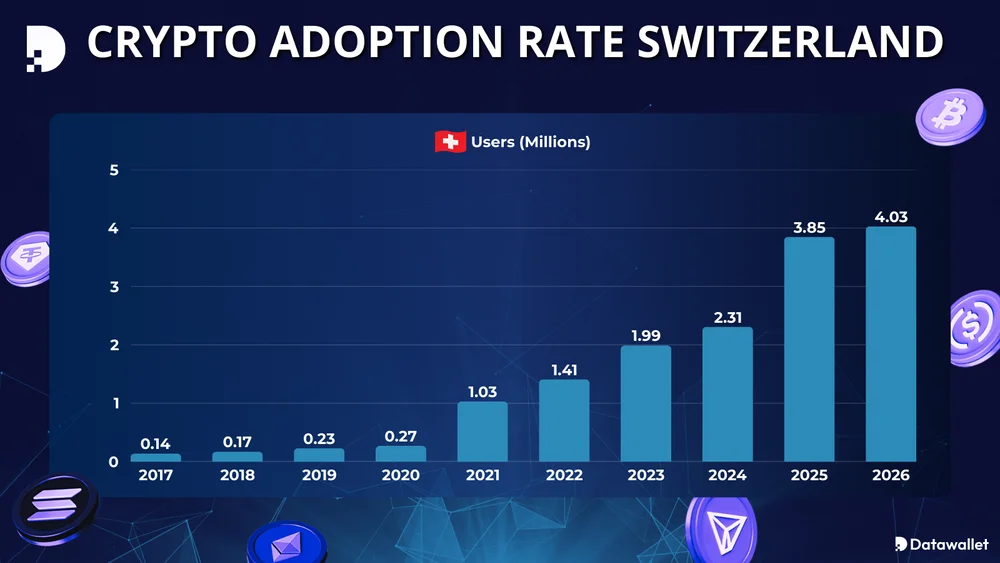
How to Buy Bitcoin in Switzerland
Swiss residents looking to purchase Bitcoin have the advantage of a regulated market, with exchanges operating under the oversight of FINMA. Here’s a simple guide to getting started with BTC in Switzerland:
- Select a Crypto Exchange: Choose a trusted platform that supports Swiss users and offers CHF deposits. Leading options include regulated local exchanges and established international platforms that meet Swiss compliance requirements.
- Create Your Account: Register with the exchange and complete the Know Your Customer (KYC) process. You’ll typically need to provide a valid Swiss ID or passport and, in some cases, proof of residency such as a utility bill or bank statement.
- Deposit Funds: Add money to your trading account using supported methods. Most platforms in Switzerland allow deposits through bank transfers with IBAN, credit or debit cards, and even direct links to local banks.
- Purchase Bitcoin (BTC): Once your account is funded, navigate to the Bitcoin trading section. Enter the amount you’d like to buy, review the order details, and confirm your purchase.
By following these steps, Swiss investors can purchase Bitcoin with confidence, knowing that they are using platforms that emphasize transparency, security, and strict adherence to regulatory standards.
Final Thoughts
Switzerland offers one of the safest and most transparent environments for cryptocurrency investing, with FINMA oversight, clear tax rules, and a wide choice of reputable exchanges.
Whether you’re a beginner using Uphold or SwissBorg, or a professional trader on Kraken, Bybit, or Binance, the key is to align your platform choice with your goals.
Frequently asked questions
Can I use Swiss banks to fund my crypto exchange account?
Yes, many exchanges that support Swiss investors allow CHF deposits through local banks, IBAN transfers, and SEPA payments. Some platforms also connect directly with banks like Bank Frick for faster settlement.
Which Swiss cities accept cryptocurrency for payments?
Zug and Lugano are leading examples; Zug accepts Bitcoin and Ethereum for tax payments up to CHF 100,000, while Lugano has introduced Bitcoin, Tether, and its own LVGA Points token for municipal services.
Are crypto exchanges in Switzerland insured or regulated for security?
Exchanges operating in Switzerland must comply with FINMA’s anti-money laundering standards and often hold additional European licenses under MiCA. While they may not provide deposit insurance like banks, leading platforms publish proof of reserves and follow strict custody safeguards.
Have any traditional Swiss financial institutions explored integrating crypto into their services?
The Swiss stock exchange operator SIX is considering launching a regulated crypto trading platform, aiming to blend institutional-grade infrastructure with access to digital assets through a trusted local institution.
%2520(1).webp)
Written by
Tony Kreng
Lead Editor
Tony Kreng, who holds an MBA in Business & Finance, brings over a decade of experience as a financial analyst. At Datawallet, he serves as the lead content editor and fact-checker, dedicated to maintaining the accuracy and trustworthiness of our insights.

.webp)
%25201%2520(1).webp)
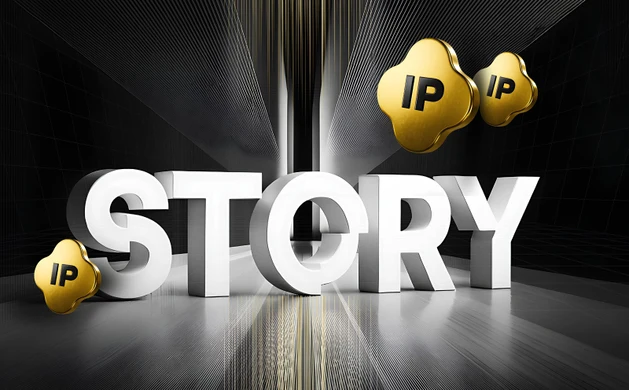
%2520(1).webp)
.webp)




